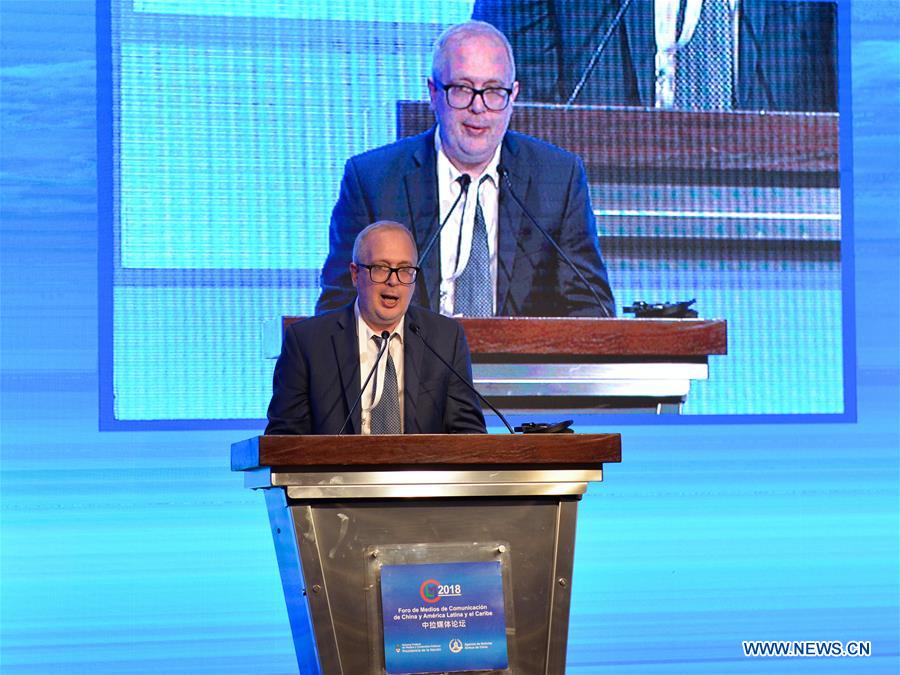China, LatAm media agree to step up cooperation
Representatives from more than 100 media outlets from China and Latin America and the Caribbean on Monday agreed to boost cooperation.
Representatives from more than 100 media outlets from China and Latin America and the Caribbean on Monday agreed to boost cooperation.

Fernando Pedrosa, national director of Public Media Planning Department, addresses the opening ceremony of the 2018 China-Latin America and the Caribbean Media Forum in Buenos Aires, Argentina, Nov. 19, 2018. [Photo/Xinhua]
Participants of the China-Latin America and the Caribbean Media Forum, held in Argentina's capital Buenos Aires under the theme "Deepening media cooperation, contributing to building of a China-LAC community with a shared future," discussed ways to promote cooperation for the benefit of both regions.
Organized by China's Xinhua News Agency and Argentina's Federal System of Media and Public Content, the three-day event drew representatives from 13 Chinese media outlets and over a hundred news agencies from more than 20 Latin American and Caribbean nations.
The forum tabled such topics as "the media's role in pragmatic cooperation between China and Latin America and the Caribbean" and "creating a China-Latin America and the Caribbean media communication platform through new media cooperation."
The "creation of a community of shared future between China and Latin America will favor mutual understanding, as well as greater cooperation and exchange between the media, sharing information through truthful, integral, objective and balanced coverage," the organizers said in a statement following the forum.
Hernan Lombardi, head of Argentina's Federal System of Media and Public Content, said that in a world "full of challenges and opportunities," it is essential to promote greater understanding between China and Latin America.
"The media have decisive importance in the formation of public opinion in our societies, so boosting exchange is bound to be beneficial," Lombardi said.
Iary Gomez Quesada, general manager of Costa Rican newspaper group Diario Extra, said that media cooperation between China and Latin America could promote cultural exchange and strengthen mutual understanding.
The television station of the group has recently introduced two Chinese TV series, which showcase Chinese culture and evoked huge responses among viewers, the general manger said.
Nestor Marin, editor-in-chief of Cuban news agency Prensa Latina, spotlighted his agency's close ties with Chinese media since its establishment in 1959.
"Help and cooperation have been factors that have contributed to bringing those who are geographically distant closer together," said Marin.
According to Marin, one challenge facing media in Latin America is how to optimally gather and broadcast information about the Belt and Road Initiative and "the impact of China's presence in Latin America."
Keith Eccleston Campbell, president and executive director of Jamaica's Public Radio Corporation, hailed the rise of new media and its ability to reach wider audience.
China is playing a fundamental role in this area by seeking "mutually beneficial cooperation and shared development with Latin America and the Caribbean through collaboration in new media platforms," said Campbell.
"China and Latin America and the Caribbean have built a bridge for exchange of content and intercultural communication. The web is the main platform used," he added.
Carlos Becerra, of Editora Peru publishing house, said China-Latin America media cooperation could be reflected in "scientific and technological support to increase coverage, ratings (and) readership."
Jose Juan Sanchez, president and founder of Brazilian multinational consulting firm CMA Group, hailed his company's recent agreement with Xinhua's economic information service.
The agreement is "primarily an opportunity to supply China with direct information on behalf of (Brazil's) agribusiness, and for us to receive information on Chinese raw materials," said Sanchez, who was among the Latin American participants at the forum.
Alejandro Ramos Esquivel, director general of Mexican news agency Notimex, said that representatives of various media organizations in China and Latin America gathered to discuss opportunities for cooperation and future trends.
As the Belt and Road Initiative becomes increasingly influential, media cooperation between China and Latin America will be deepened, he said.

